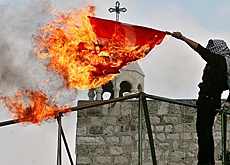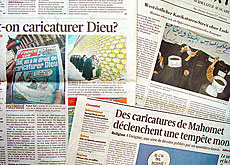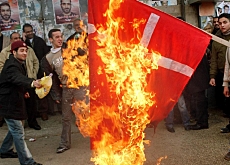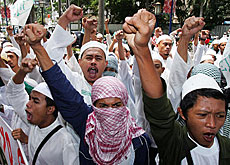Swiss ethicists address religious outrage

Violent protests against the publication of Mohammed cartoons show no sign of abating. But in Switzerland moderate voices have also begun speaking up.
Reinhard Schulze, an expert on Islam, and Georg Pfleiderer, a theologian, call for the rapidly spreading religious rage to be contained.
Muslim anger towards the publication of caricatures of their prophet, Mohammed, is becoming increasingly vocal and violent. Embassies and European Union institutions have been attacked and foreign flags set on fire.
But now, after the initial shock, moderate voices are starting to be heard more – on both sides.
Tariq Ramadan, a Swiss Muslim intellectual, has called for more self-reflection on the part of Muslims – but added that this cannot be forced on them from outside.
Georg Pfleiderer, a professor of theology at Basel University, condemns the violence outright and states soberly: “I think many people in the West have until now underestimated the problems Muslims have with religious caricatures.”
Although he refuses to interpret the rioting as confirmation of Samuel Huntingdon’s “clash of civilisations” thesis, he admits “certain ancillary incidents have shown elements of its truth”.
“It is all the more important that the West reacts level-headedly and not on impulse – fearfully or aggressively. That involves the promotion of an understanding for democratic and constitutional principles. It is up to all those involved to qualify Huntingdon’s thesis in concrete terms.”
Resolution
Pfleiderer emphasises that in this argument the voices of moderate and discriminating Muslim intellectuals can both throw oil on the fire.
He says comparable portrayals in a Christian context would also trigger outrage among believers but not to the same extent that the current images have done among Muslims.
Pfleiderer puts this down to the “lesson of resolution” taught by Christianity.
“This says that religion, in this case Christianity, can and must declare its support for the protection of basic human rights – and the freedom of expression and freedom of the press belongs to that.”
Taboo
Reinhard Schulze, professor of Islamic studies at Bern University, says the breaking of a taboo is what provoked the massive reaction from Muslims.
“That causes physical and mental pain among believers and goes far beyond the normal level of victimhood caused by a caricature.”
Schulze adds that the political background – the situation in Iraq and of the Palestinians – reinforces the impression among Muslims that they are open to Western attacks on all fronts.
He also believes that certain regimes in the Middle East are exploiting this controversy.
“Anything that gives rise to a great conflict between the Muslim world and the West is highly productive for many regimes, such as Iran, as they can then justify their actions a lot more easily.”
Learning process
Schulze says dialogue between the civilisations has not yet collapsed – “but it is certainly fading”.
He adds that after Huntingdon’s evocation of a culture war in the 1990s, “we can’t now get rid of this sorcerer’s apprentice because the protagonists are increasingly orientating towards that set-up and in fact their entire political agenda is embedded in such a huge clash of civilisations”.
Schulze calls for a greater appreciation in the West of the problem. “Whoever publishes such caricatures has to realise that those offended are here among us and could put up a fight.”
He says a learning process is now advisable, but it could last several years.
swissinfo, Susanne Schanda
According to the census of 2000, there are 311,000 Muslims resident in Switzerland.
Most Muslims here come from the Balkans or Turkey.
In 1990 Muslims represented 2.2% of the total population, a proportion that had risen to 4.3% by 2000.
In September 2005 the Danish newspaper Jyllands-Posten published 12 satirical cartoons featuring the prophet Mohammed.
Diplomats of several Arab countries protested to the government of Anders Fogh Rasmussen demanding an apology, which he at first rejected.
On January 10 a Norwegian magazine and later other European newspapers, including some in Switzerland, published individual cartoons.
The Muslim protests, which escalated in early February and were targeted against Denmark and other European countries, have resulted in a number of deaths.

In compliance with the JTI standards
More: SWI swissinfo.ch certified by the Journalism Trust Initiative



You can find an overview of ongoing debates with our journalists here. Please join us!
If you want to start a conversation about a topic raised in this article or want to report factual errors, email us at english@swissinfo.ch.